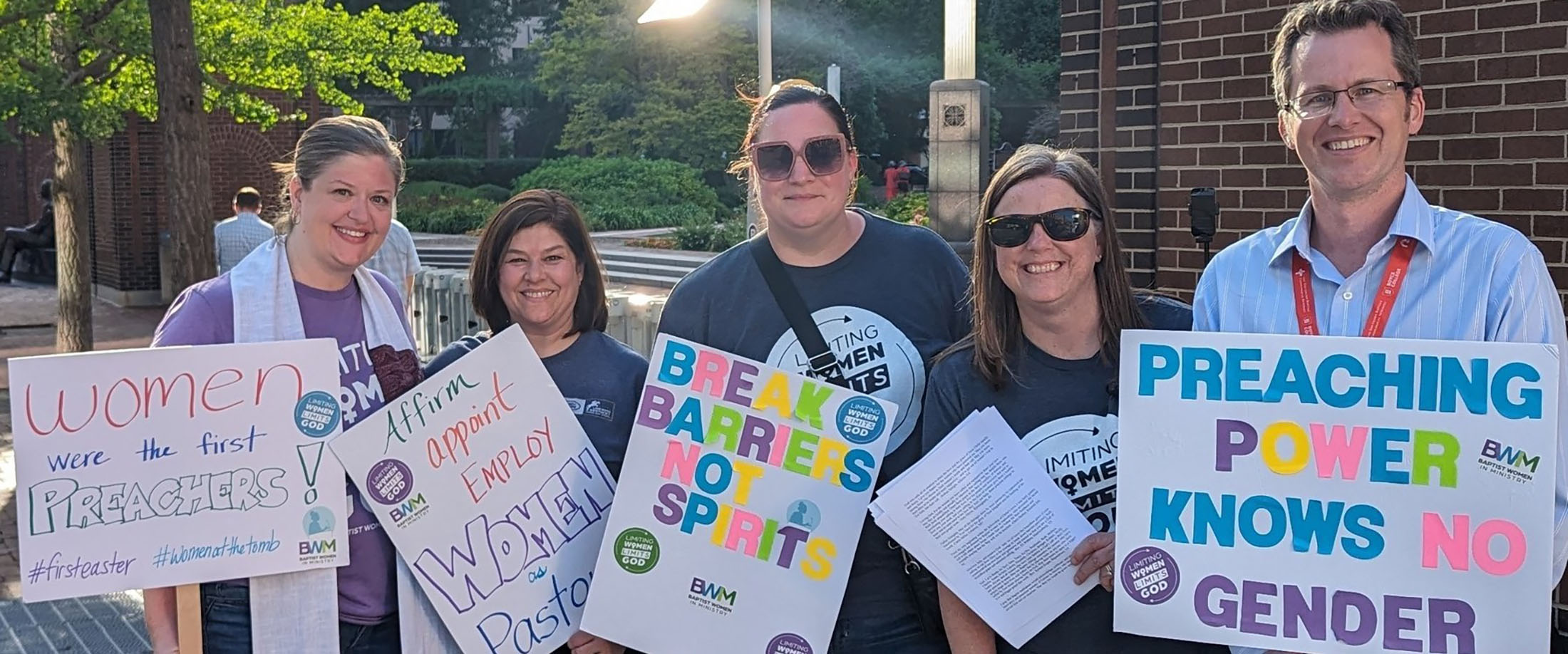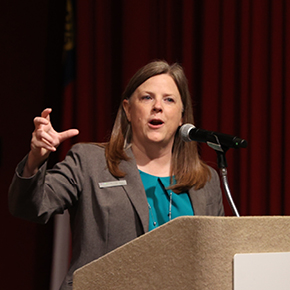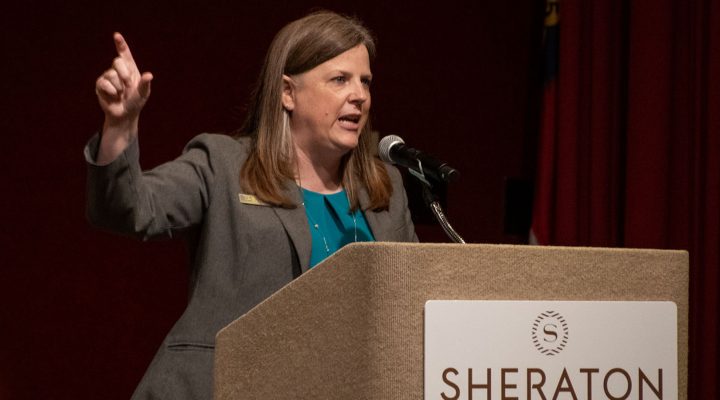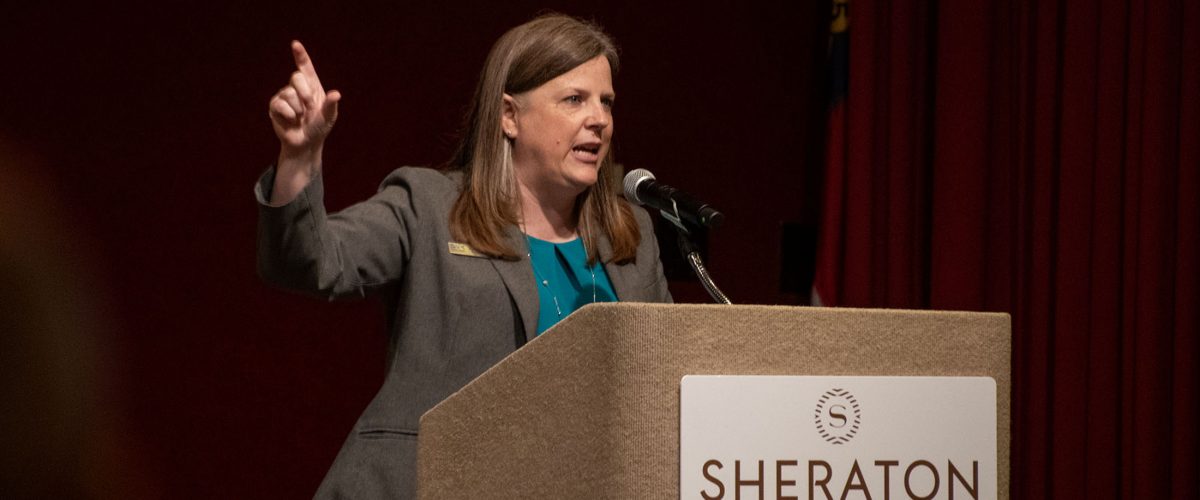Baptist Women in Ministry is committed to supporting female ministers across the breadth of the Baptist denomination — from the Southern Baptist Convention to the Cooperative Baptist Fellowship, BWIM Executive Director Meredith Stone told participants at the organization’s annual luncheon during the CBF General Assembly June 21 in Greensboro, N.C.
Stone described what she and other BWIM staff and supporters experienced on “Protest Corner” outside the Southern Baptist Convention’s annual meeting the previous week in Indianapolis.
At that meeting, Southern Baptists voted on the second reading of the so-called Law Amendment, which proposed removing from the convention all churches that employ women with any title that uses the word “pastor.” Although more than 61% of voters affirmed it, the proposal failed to receive the required two-thirds majority vote.
But the SBC’s doctrinal statement, the Baptist Faith and Message, still proclaims the church offices of pastor and elder are limited to men. Consequently, the convention still can — and does — remove congregations for hiring female pastors. It did so in Indianapolis, where participants voted to disfellowship First Baptist Church of Arlington, Va., whose pastor for children and women, Kim Eskridge, is a woman.
“We were there as your physical presence in that place to offer your prayers … in hopes of a more inclusive and loving representation of God’s work in this world.”
Meanwhile, out on Protest Corner, Stone reported: “We just stood there and held our signs with our positive messages that women have equal value to God, the church and pastoral ministry. We were there as your physical presence in that place to offer your prayers — the prayers of our community of affirmation of women in ministry — in hopes of a more inclusive and loving representation of God’s work in this world.”
“People had mixed reactions” to their signs of affirmation for female ministers, she added. While many heckled and even wagged fingers, some expressed thanks, “especially when they weren’t in a crowd, and they were by themselves.”

BWIM protesters at SBC annual meeting
“But while the Protest Corner and the reactions to us were confused, so were the actions of the SBC last week,” Stone said. She pointed to the contrast between claims the Law Amendment’s failure was a victory for women in ministry and the fact it still received a lopsided favorable vote, as well as the reality that the SBC still removes churches for having female pastors.
“But if you listened to the convention business and the discussion surrounding votes and resolutions, if you listened as they talked about women’s bodies and souls, you didn’t have to read between the lines to understand that this is not the end of the Southern Baptist Convention using women as disposable props in their attempts to vie for political power,” she said. “And perhaps even more painful, this is not the end of Baptist women being devalued, diminished, denigrated and not believed.”
“This is not the end of Baptist women being devalued, diminished, denigrated and not believed.”
Stone acknowledged people have asked, “Why would Baptist Women in Ministry even engage the Southern Baptist Convention, who has continuously demonstrated, codified and enforced its oppressive patriarchal theology?”
“Our answer has been that even though the SBC — its structures, its systems — are not worth fighting for, there are people who are still there,” she responded. “Women are still in those systems. Millions of women are hearing incorrect messages from the SBC about their inequality, and they need to hear a different message that tells them they are created in the image of God, that they do have equal value to God in the church, and that there are no limits to how they can join in God’s word in this world.”
“What if someone had given up on us and not come and shared that message with our churches?” she asked.
“It was worth it if one woman or little girl might have seen or heard our message and realized there’s a different way of thinking about her freedom in Christ. It was worth it for the people who had to stealthily agree with us, that they might know there are others out there and maybe feel emboldened to share that a little more loudly.

Meredith Stone (CBF Photo)
“It was worth it for the man who saw that our approach was a little more Christ-like (than other protesters), and so perhaps he pondered our message more deeply in the weeks ahead.
“And it was worth it for Pastor Kim and the contingent from First Baptist Alexandria, who stopped by our corner on their way back into the convention center to hear the results of the vote (to remove them from the SBC). It was worth it for them to see that someone was there who was for them, someone was there who not only agreed with them but was willing to stand up and speak out for their beliefs.”
Stone cited an email from a female pastor who no longer identifies as a Southern Baptist but serves a church that is dually aligned with the SBC and CBF. The woman followed the proceedings at the SBC’s annual meeting while leading her church’s vacation Bible school.
“I was deeply saddened as ministers spoke sometimes vaguely over ‘tertiary issues,’ ‘lesser issues,’ and they said those words,” she told Stone. “It was clear to me the ‘issue’ they were speaking about was my call to ministry. The ‘lesser issue’ was the call to which I had given my entire life, the hill on which I chose to die if needed. The phrase was demeaning, demoralizing, disappointing. …
“No one in a room filled with over 10,000 church members who claim to love and follow the same Jesus who I believe called me to ministry stood up and said one single word for women. For me, the silence was deafening.”
The woman noted “the SBC does not need an amendment when they have proven their power to kick out churches both large and small who keep women on their staff.”
In conclusion, she told Stone: “I am sad. Angry. I’m hurt. But above all else, I’m still called. … My voice may not be loud, but it is mine.”
Sadly, that pastor’s experience represents women across Baptist life, Stone observed.
“Your ministry is valid. You do not deserve to be disparaged, belittled or demeaned.”
“Here’s what I want you to hear me saying,” she added, addressing women called by God to ministry. “Your ministry is valid. You do not deserve to be disparaged, belittled or demeaned. Your call to the ministry is not a ‘lesser issue.’ Your identity as a minister, as a pastor is not a ‘tertiary matter’ that is less important than the gospel. It is the gospel.
“The gospel of Jesus should be the good news that makes us all free. It reconciles us toward the image of God and who we are created to be. It cares about our bodies and our voices. It believes us when we say we have been called. It seeks to offer us comfort when we have been hurt. It liberates us from the boxes which humanity has dictated that we have to live in. … Regulating what women can and cannot do is the opposite of the gospel.”
Turning her focus from the SBC to CBF, Stone admitted: “Protest Corner in Indianapolis is not the only corner of Baptist life that is sometimes confusing for women in ministry and is sometimes confusing for other persons who have been limited and denied freedom and whose whole humanity has been disregarded.
“We also need to recognize that while we have made progress, significant progress that deserves to be celebrated, Cooperative Baptist Fellowship, we’re still on the journey. All Baptist groups that are affirming of women in ministry are on that journey with us, because many times … the affirmation women in ministry hear spoken does not match our experience.
“Patriarchy and sexism are entrenched in our society and in our faith. And when it’s not coming out in overt aggression, it comes out as microaggressions, which are stacked upon more microaggression, which are layered on top of mixed messages that we hear from both within the church and outside the church.”
BWIM is committed to affirming all Baptist female ministers — from the Protest Corner at the SBC meeting to within the reach of CBF, Stone promised.
“Being a Baptist woman in ministry, even in more affirming environments, is a confusing corner, where 2,000 years of our practice of faith intersects with our relatively new liberative focus, and it’s here at this corner that Baptist Women in Ministry is doing our work.”
Related articles:
A primer on why Southern Baptists are fighting over women in ministry once again
Don’t be lulled by the failure of the Law Amendment | Analysis by Mark Wingfield
The Law Amendment is one more SBC backlash against women | Analysis by Meredith Stone
Churches that support women in ministry should leave the SBC preemptively | Opinion by Meredith Stone


